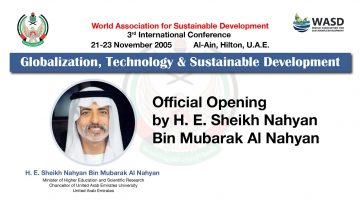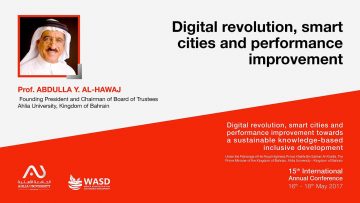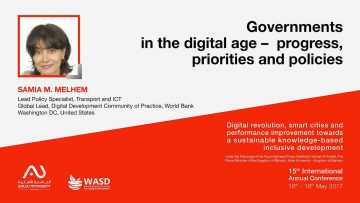The New Global Economy: challenges and opportunities
Introduction
This workshop aims to assess the country’s performance to implement the pillars of the knowledge-based economy (KBE). In doing so, the workshop will discuss the country’s position in terms of transition to a KBS, highlighting weaknesses, strengths and opportunities. The country’s worldwide performance was particularly matched against that of the other members of the region together with few examples from countries like China. The workshop deals first with the issues of KBE and its links with sustainability from a conceptual point of view. It highlights the specific situation of the country stressing the difficulties its meet in this respect and shows how knowledge capabilities are highly correlated with levels of sustainability using knowledge and sustainability indexes. The workshop will also summarises the key policy initiatives taken in countries like China over recent years to enhance the employability of university graduates and to encourage the creation of a stronger entrepreneurial content and purpose into education. The workshop also presents the results of a major programme of entrepreneurship training in China involving approximately 1.5 million trainees. To what extent can either the policy initiatives and/or the approach to developing business skills in China be useful in other countries is the key issue in this workshop.
Objectives
- Background and Concepts – How can knowledge contribute and enhance competitiveness and sustainable development?
- Understanding knowledge economy and the role of human capital.
- How to transform your economy to a knowledge-based economy.
- Can entrepreneurs be created and are entrepreneurs different?
- Environmental: economic, social and political.
- Designing entrepreneurial incentives
- Designing an entrepreneur policy framework.
- To inform understanding of the nature of entrepreneurship training in China.
- To enable critical discussion of entrepreneurship ‘essentials’.
- Policy Lessons
Program Structure
- What is the Knowledge-based Economy? Key Policy Lessons
- Meeting China’s Employment and Business Skills Challenge through Entrepreneurship Training
Benefit for Participants
- It is a great opportunity for the participants to understand the pillars of knowledge economy as well as the critical role and limits of incentives for FDI.
- Active participation in theoretical and policy debate.
- Providing training and educational opportunities for participants.
- Offering networking opportunities for participants and businesses.
- Meeting with professional international keynote speakers.
- Meeting with professionals who are considering changing their careers.
- Motivating participants to armaments science.
Benefits for Employers
- Enhance relationship with different organization.
- Meeting with participants.
- Raising institutional image, profile, awareness, and market exposure for the future intakes.
- Post event publicity through social media marketing, bulletins and word of mouth.
- The opportunity for Universities to showcase their role in community service.
Course Material
Included in the course fee, the following learning materials will be provided:
- All overhead slides/transparencies.
- Case studies (print and video) used on the course.
- Certificate of attendance from MEKEI, UK














































